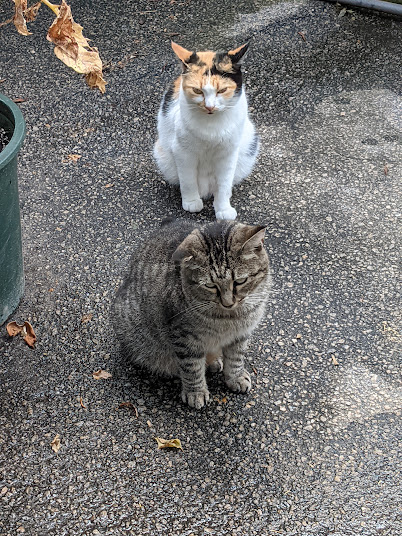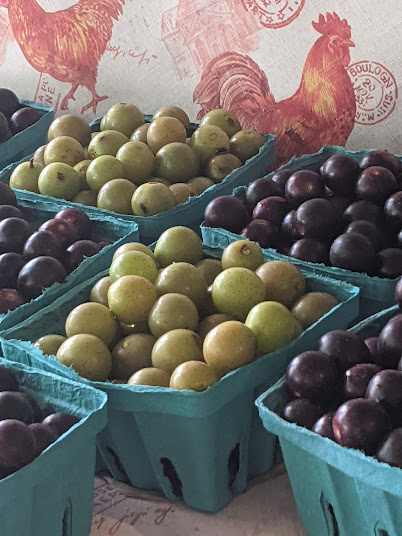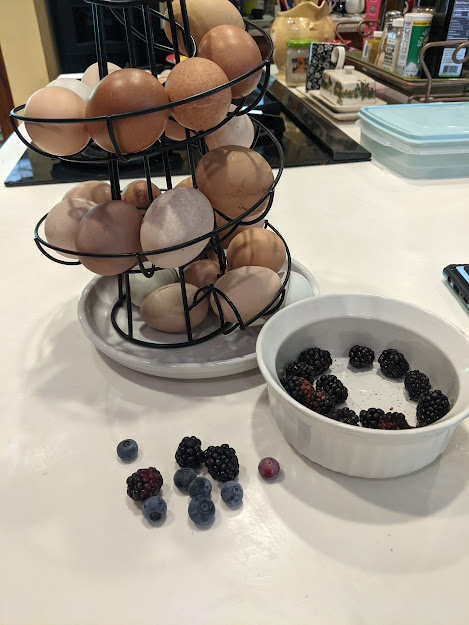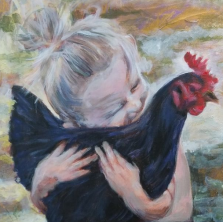We’re talking about navigating the challenges of homesteading this week. We have a lot in common with the homesteaders, including some common challenges. For someone considering homesteading, we offer a “homesteading lite” version that you can visit for a few days. Hopefully, that will give you some ideas about the challenges and pitfalls.
The Firefly is a little bed and breakfast not too far from Madison GA. It’s rural enough to get a taste of country life, and breaking a sweat will be optional for guests. We have abundant resources for edible landscaping, foraging for food in Georgia, and do a lot of gardening and animal management.

What is Homesteading?
Homesteading, the practice of living off the land and being self-sufficient, has become increasingly popular in recent years as more people seek to escape the fast-paced, stressful world of modern life. We have repeatedly said that we are “homesteader wannabees.” Homesteading can also come with its own set of challenges and difficulties, and it’s important to be aware of these before diving into a homesteading lifestyle.
Lack of a Steady Income
One of the main challenges of homesteading is the lack of a steady income. While homesteading can be a great way to save money on living expenses, it can also be difficult to make a living from the land. Many homesteaders rely on selling produce or products they make from their homestead, but these ventures can be uncertain and subject to fluctuations in the market.
We have addressed this problem by doing it in reverse; We have set up the Bed and Breakfast life to generate a little income. We can ease into homesteading when we get the chance.
Challenges of Homesteading: Work and Effort
Another pitfall of homesteading is the amount of work and effort required to maintain the homestead. Homesteading requires a significant amount of time, effort, and resources to grow crops, care for animals, and maintain the homestead. For those who are not prepared for the hard physical labor, the realities of homesteading can be overwhelming.
In addition to the physical labor, homesteading can also be emotionally taxing. Being isolated and away from friends and family can lead to feelings of loneliness and isolation. This can be especially difficult for those who are not used to spending a lot of time alone.

Support Resources
The isolation and lack of community can also make it difficult to access resources and support when it is needed. If you’re dealing with a problem with your homestead, it may be difficult to find someone to help you, especially if you live far away from other homesteaders.
Finally, the cost of starting a homestead can be prohibitively expensive. While homesteading can be a great way to save money in the long run, the upfront costs can be substantial. You’ll need to invest in equipment, supplies, and infrastructure to get started, and these costs can quickly add up.
Other Potential Pitfalls: Navigating the Challenges of Homesteading
While homesteading can be a rewarding and fulfilling way of life, it’s important to be aware of the potential pitfalls and to be prepared for the challenges that come with this lifestyle. Before making the decision to homestead, take the time to consider your goals, your skills, and your resources, and make sure that you’re prepared for the challenges that come with this way of life.
Joel Salatin’s Pitfalls of Homesteading, and how we’re dealing with them.
Our homesteading hero, Joel Salatin, had some comments on some of the specific pitfalls of homesteading management.
I’ve put a link below to a video by Joel via one of our other homesteading heroes, Justin Rhodes.

Navigating the Challenges of Homesteading: Animal Management
Joel thinks that a major pitfall of homesteading for the inexperienced is “animal management.” This is because they’re not used to handling animals at all.
They bring in animals without being prepared, out of excitement. But, because the reality of animals differs a lot from the TV version, they’re unprepared in terms of feed, area to run, vaccinations and other issues that could be harmful or fatal.
That actually happened to us recently when we got the first “converter.” The neighbors were helpful in reminding us that we needed some confinement so that it could run free and have room to forage, and that would have been better thought of “before” the converter showed up. Lesson learned. We have a big pen now, and are working on another one.
A further story is of the nice little suburban dog that visited us lately, who wouldn’t hurt anybody, but instantly turned back into a wolf the first time he saw one of our little chickens. Beware. Dogs are also animals.
Water Management
Water is heavy, and no one likes to manage it.
For the first two years of the project, really for the first year, the problem was excess water. This is because we had heavy rain, and the groundwork wasn’t done properly.
Now it is now, and the watering challenge is getting water to the converters and chickens.
Mostly, we have everything close enough to the house that we can run hoses rather than haul it by bucket. We do also have a sprinkler system, installed at great expense and questionably worth it. We could just as easily convert this to water transport if we were sufficiently motivated, since some of the sprinkler heads are within a few feet of the animals and garden areas.
Genetic Management
Some fraction of the problem with animals, to put it bluntly, is that some of them are jerks. Having a chicken that is a jerk is one thing, but having a large, mean animal like a pig or cow is another. I believe we have a post elsewhere about “the most dangerous animal in Georgia” and it’s the cow.
The prospective homesteader should be familiar with the practice of “culling” which is a friendly way of saying “getting rid of” problem animals. If you have an animal that is a jerk, you don’t let it reproduce, and don’t let it ruin your day.
We had an example of this. In the very beginning, we had a little rooster named Jacques, who was mean as hell. He would make a run after everyone and everything that came into the yard.
One sunny day he made a run at someone and it caused bleeding and swelling. After that Jacques had an “accident.” Prospective homesteaders are urged to deal with deviants ruthlessly.
Minerals
Joel believes that mineral management is important, so he supplements his chicken and livestock with excess minerals. His favorite one is kelp, which has in it all of the elements of seawater. This supposedly gives the exact balance that most animals need.
He believes in over-supplementing, because any minerals that the animals don’t use will go into the soil, and help the soil.
We do supplement the chickens from time to time. We do not as yet supplement the other animals because we think we’ve picked the kind of animals that don’t need it.
Sanitation and Hygiene
This is a major thing for small farmers because there is an element of work to it.
Here is the general issue: Animals poop. Unlike the lovable chickens on cartoons, that never poop, a “real” chicken poops about the same amount as it lays, about 4 ounces a day.
There is a component of this activity that is involved in keeping this nasty stuff under control. Chickens are a bit messy, but what is really messy are pigs and cattle. To control this, there is an element of facility management. You need a proper amount of space, and proper bedding to make sure this doesn’t get out of hand, especially in the summer.
Joel’s rule of thumb is that if an animal noticeably stinks, you’re doing something wrong, and you need to change the conditions.
At our place, since we welcome guests, we do the best we can to manage this. We have two chicken tractors at the moment to spread the love out into the front field. We also bed our chicken coops down all the time with hay to keep this under control.
Inexperienced Baby Sitters
We touched on this above, and Joel sees this as an issue. From time to time, you need to step off the farm for a few days. You need to have a backup system of babysitters and helpers to keep the place in order in the event there is some catastrophe.
Joel and Justin Rhodes have both progressed enough that there are groups of young hippies nearby who appreciate what they are doing and are equipped to help out if the animals need to be fed.
But, not everybody has that, and we are a bit limited in that way.
Navigating the Challenges of Homesteading: Pitfalls to Know
We’re just scratching the surface on this as you know. We’ve recently done an article on disaster planning as well, to give the prospective homesteaders some further practical advice on being prepared.
We welcome this chance to be a resource to the homesteaders, and will give whatever help we can.
A good idea is to book a “homesteader learning weekend” and we will let you walk around the place, interact with the scene, and ask questions.
Click the “book now” for further info.
Links and References
www.fireflymadison.com/human-scale-living/
Joel Salatin Video
![]()
